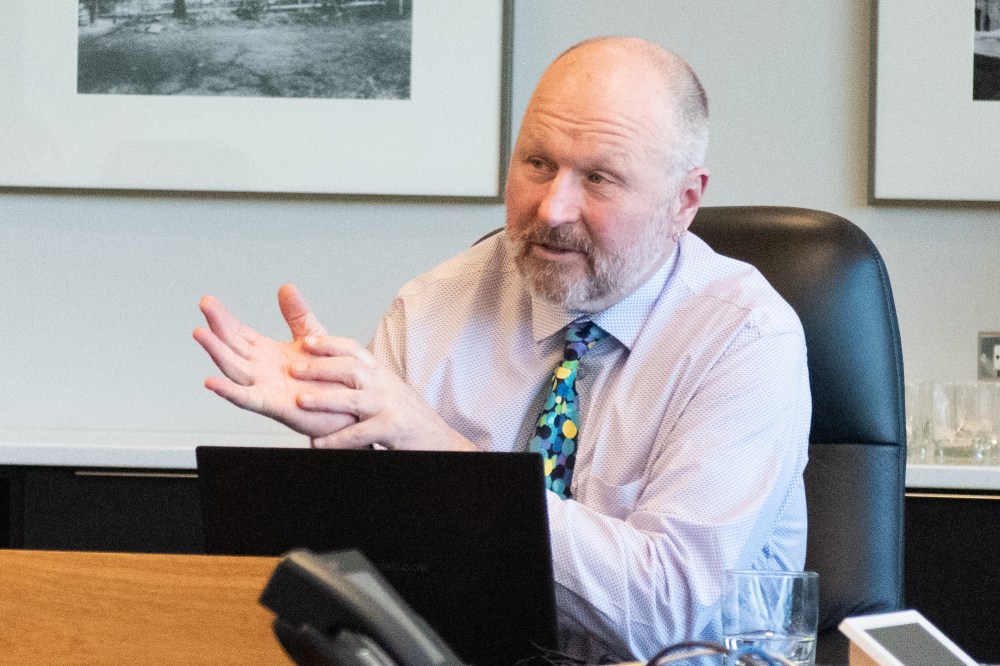Canadian trade commission minister talks trade with the U.K.
Advertisement
Hey there, time traveller!
This article was published 23/11/2023 (630 days ago), so information in it may no longer be current.
For those looking to expand their business outside of Steinbach and into a global market, the High Commission of Canada is there to help your business grow.
On Nov. 16, the commission’s minister-counsellor Andrew Smith was in Steinbach to speak about the economic connection between Canadian businesses and the U.K. market.
“In terms of our relationship to the U.K. it is about a $420 billion economic relationship if you factor in trade, goods and services, portfolio investments, foreign portfolio investment, exchange of students, and remittances,” said Smith.

The U.K. is a very small market geographically, but a population that is double Canada’s. The U.K. market is the world’s sixth largest economy and the second largest economy in Europe after Germany. The U.K. is Canada’s second largest trading partner after the U.S. for trade in services.
Steinbach economic development director Michelle Bezditny said Steinbach agribusiness and agtech companies are looking to expand into the U.K. and German markets and that the presentation with Smith was the first step in exploring those markets.
“Steinbach economic development has highlighted a vision and our vision is to be the center of advanced agribusiness, where we’re based in the prairies but we’re exporting to the world. We have identified key sectors: food production, manufacturing, agtech, clean tech, (and) information and communications technology.
“We’re finding there’s many new and successful ag tech startups. That is a result of our heritage, which is in agriculture and as agriculture has morphed into agribusiness and ag inputs, which includes agtech. So, moving legacy farms to smart farms, whatever it looks like, we’re finding that these agtech companies are starting in Steinbach, choosing to do operations in Steinbach, because of our integrated ecosystem of support in that sector.”
“In terms of agriculture,” said Smith. “The agriculture market is about a 4.2 million employer and it generates over $115 billion in value added for the economy in the U.K. What’s critical in the U.K. market is they import 40 percent of the food it consumes. It’s highly reliant on imports.”
Some of the Canadian food companies that operate in the U.K. are McCain, Clearwater Foods, Ocean Choice, and Saputo.
“If you take a look at the prairies there is 200,000 tons of wheat that goes from Manitoba and Saskatchewan supporting 500 farmers that go into the U.K. to Warburtons, (which) is the largest bakery in the U.K. Every loaf of bread that comes out of those factories has Canadian wheat in it. McCain French fries has five facilities in the U.K. They purchase alone 15 percent of all potato output in the U.K.,” said Smith.
There are some challenges to being in the U.K. market. Aside from the death of the Queen and a revolving door of prime ministers, they’ve been paralyzed by various strikes, according to Smith.
“They face ravaged inflation – it was 19.3 percent in food. Energy inflation has gone up as they’ve been impacted by the Russia-Ukraine war. And then Brexit did not go as well as expected. The economy actually contracted after Brexit. So they’re still trying to improve,” he said.
Those who are interested in entering the U.K. market can contact the regional office for the trade commission as the first step. It’s a free service where they help you navigate free trade deals and networks.
There are two points that the commission asks of businesses who are looking to expand globally. One is a commitment to the market and do your homework upfront.
“Know what you want, look at the landscape and the ecosystem, what is your competitive advantage in the U.K. and then you can deal with the trade commissioner to have that conversation,” said Smith.
“The second thing is you must be able to make a meaningful economic benefit to Canada. We will work with multinationals as long as what they’re doing in Canada, and they’ve invested in Canada, as long as what they’re doing overseas they want our help, we’ll help support those Canadian operations.”
An example Smith gave was supporting Airbus, which is a French company that has a manufacturing plant in Montreal for the A220. When Airbus is marketing the A220, Canada will help them do that.
“At the end of the day we don’t do sales pitches. We don’t sign contracts. What we can do is bring partners together and help create the infrastructure,” said Smith.
The trade commission has been in the U.K. since 1903. It currently has 800 clients, but there are upwards of 3,700 Canadian companies in Britain and Northern Ireland. The commission has 160 offices across the globe.
